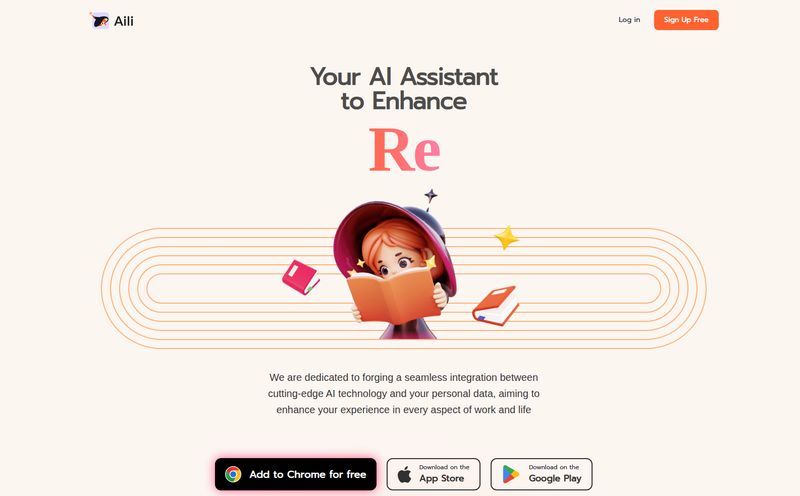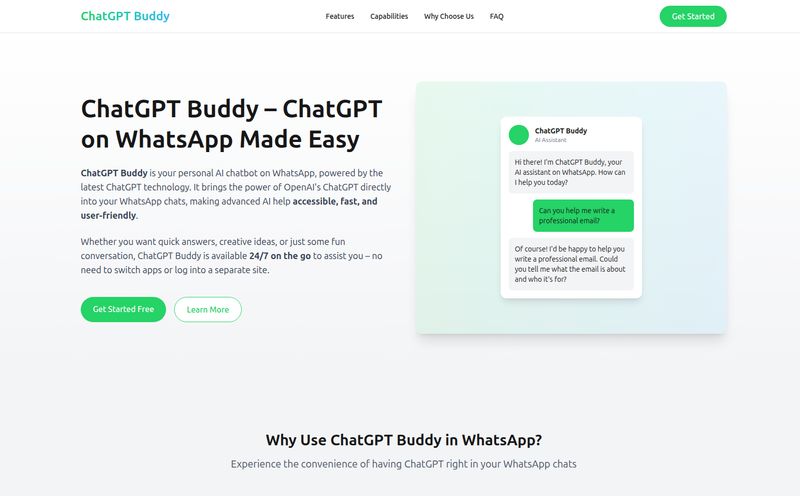We’ve all been there. That little notification ping from your airline app that makes your stomach drop. FLIGHT DELAYED. Or worse, CANCELLED. Suddenly, your well-laid plans are up in the air—literally—and you’re thrown into a vortex of long customer service queues, confusing information, and mounting frustration. It's chaos. Pure, unadulterated, 'why-is-no-one-answering-the-phone' chaos. For airlines, this isn't just a customer service headache; it's a full-blown operational and financial wildfire that can torch brand loyalty in a matter of hours.
For years, I've watched this dance from the sidelines, both as a frequent traveler and as an SEO professional obsessed with user experience. A broken customer journey is a broken brand promise. So when I stumbled upon a platform called VoyagerAid, which claims to 'transform airline disruptions,' my curiosity was definitely piqued. Could a piece of software really solve one of the travel industry's most painful and persistent problems? I decided to dig in.
First Off, What Exactly is VoyagerAid?
Let's get the jargon out of the way. VoyagerAid is an airline disruption management solution. In simpler terms, it’s a specialized software platform (SaaS, for the tech-savvy) designed to help airlines manage the pandemonium when things go wrong. Instead of having a dozen different systems and panicked agents trying to handle thousands of angry passengers, VoyagerAid offers a unified command center. It automates communication, helps with rebooking passengers, and even manages compensation, all from one place.
Their website mentions it's a 'white-label' solution, which means an airline can brand it as their own, creating a more cohesive experience for the passenger. And it's powered by the big cloud players like AWS and Azure, which tells me it’s built for scale and reliability. But fancy tech specs are one thing; real-world impact is another.

Visit VoyagerAid
The All-Too-Familiar Travel Nightmare
Think about the last time a major weather event or technical issue caused a wave of cancellations. The airline's call centers are instantly overwhelmed. The social media team is drowning in a sea of angry tweets and DMs. The gate agents are facing a line of desperate travelers. Information is inconsistent, and rumors fly faster than the planes are supposed to. It’s a complete system breakdown.
This is the core problem VoyagerAid is trying to solve. It’s not just about sending an automated text message. It's about orchestrating the entire response, from the first sign of trouble to the moment the last passenger is on their new flight. Honestly, the ambition is pretty impressive.
How VoyagerAid Aims to Fix the Mess
After poking around their site and looking at their listed features, I've managed to piece together how their system works. It seems to boil down to a few key areas.
A Single Source of Truth: Multichannel Mayhem Managed
One of the biggest wins I see is the multichannel integration. Today's passengers contact airlines through every channel imaginable—email, phone, web chat, Twitter, Facebook Messenger. VoyagerAid pulls all of these conversations into a single, unified inbox using a Smart Ticket Management system. For a support team, this is a godsend. No more switching between five different tabs to see if a passenger has already been helped. It turns a firehose of frantic messages into an orderly queue, which is the first step to regaining control.
Predictive Power and Proactive Communication
This is where things get really interesting. The site talks about being 'Powered by Predictive Analytics.' This suggests the system doesn't just react to disruptions; it tries to anticipate them. By analyzing operational data, it could potentially flag a flight at high risk for a maintenance delay before it's officially announced. This allows the airline to be proactive. Instead of a blunt 'your flight is cancelled' message, they can send a notification that says, 'We've detected a potential issue and have already rebooked you on the next flight. Click here to accept or view other options.' That single change in approach transforms a passenger from a victim into an empowered customer. It’s the difference between chaos and control.
Instant Answers and Smarter Agents
Like many modern support platforms, VoyagerAid includes a Knowledge Base. This is a repository of answers to common questions, which can power self-service portals and chatbots. So, for simple queries like 'What is my meal voucher value?' or 'Where is the partner hotel?', passengers get instant answers without needing to speak to a person. This frees up human agents to handle the truly complex, emotional situations that require a human touch. The platform also provides 'Canned Responses', which helps agents reply faster and with more consistency. A small feature, but one that has a massive impact on efficiency.
Seeing the Forest for the Trees with Analytics
As a data guy, the promise of Custom Reports & Analytics always catches my eye. How long does it take to rebook passengers? What are the most common queries during a disruption? Which communication channels are most effective? This data is pure gold. It helps airline management understand performance, identify bottlenecks, and make smarter decisions for the next time things go sideways (and they always will). Without data, you’re just guessing. With it, you're optimizing.
The Good, The Bad, and The… Unknown
No tool is perfect, and from my analysis, VoyagerAid has some clear strengths and a few question marks.
The Upside: Why I'm Genuinely Impressed
The biggest pro is the sheer efficiency it promises. Automating the grunt work of communication and re-accommodation saves an incredible amount of time and money, and it drastically reduces the chance for human error. It allows an airline to scale its response in a way that’s impossible by just hiring more people. A quote on their site from a 'Head of Operations' at a pacific airline says it best: "...passenger rebooking is quicker and more accurate." That's the dream. By turning a negative event into a smooth, self-service recovery process, an airline has a real shot at increasing customer loyalty, not destroying it.
A Few Caveats to Consider
On the flip side, there's always a risk with automation that you lose the personal touch. While a smooth automated process is better than a chaotic human one, some situations just need empathy. The key is finding the right balance, which is more about the airline's strategy than the tool itself. The bigger issue, for me, is the pricing. Or the lack thereof. The VoyagerAid website provides no pricing information. This is pretty typical for enterprise-level B2B software where the cost depends on the airline's size and needs, but it's still a hurdle. You can't just sign up for a free trial; you have to go through the classic 'Request a Demo' funnel to talk to sales. Not a deal-breaker, but something to be aware of.
So, Who Is VoyagerAid Really For?
This platform is clearly not for a small local charter service. This is an enterprise-grade solution built for regional, national, and international airlines that deal with disruptions at scale. Any airline that has ever seen its operations grind to a halt because of a snowstorm, IT outage, or fleet-wide issue is the prime customer here. It’s for operations and customer experience leaders who understand that the cost of a single, poorly handled mass disruption event can run into the millions, not just in direct costs but in long-term brand damage.
FAQs about VoyagerAid
1. Is VoyagerAid an app for passengers to download?
No, VoyagerAid is a business-to-business (B2B) software solution that airlines purchase and integrate into their own systems. Passengers interact with it through the airline's own website, app, or communication channels (like SMS or email).
2. How does the platform handle flight rebooking and compensation?
It automates these processes based on the airline's predefined rules. For instance, it can automatically find and offer the next available flight and issue digital vouchers for hotels or meals according to the specific situation and passenger eligibility.
3. Can VoyagerAid really predict flight disruptions?
Its predictive capabilities likely focus on operational data points like crew schedules, aircraft maintenance logs, and incoming aircraft statuses. This allows it to forecast likely operational delays or cancellations. It wouldn't be able to predict sudden, unpredictable events like a sudden airport closure due to a security threat, for example.
4. How can I find out how much VoyagerAid costs?
Unfortunately, pricing is not publicly available. You need to contact their sales team directly, likely through the 'Request a Demo' form on their website, to get a custom quote based on your airline's specific needs.
Final Thoughts: A Step in the Right Direction?
Look, air travel is a complex beast, and disruptions are an unavoidable part of the equation. No software will ever eliminate them entirely. But what VoyagerAid represents is a fundamental shift in how airlines can respond to them. It's a move away from a reactive, chaotic scramble toward a proactive, orchestrated, and data-driven strategy.
For passengers, it means less time on hold and more control over their situation. For airlines, it means lower operational costs, less strain on their staff, and a chance to protect their brand reputation when it matters most. While the lack of public pricing is a bit of a black box, the concept itself is incredibly sound. If they can deliver on their promises, VoyagerAid could genuinely be a game-changer for an industry in desperate need of a customer experience overhaul.
Reference and Sources
- VoyagerAid Official Website
- SITA Passenger IT Insights 2023 (For general industry trends on technology in air travel)



